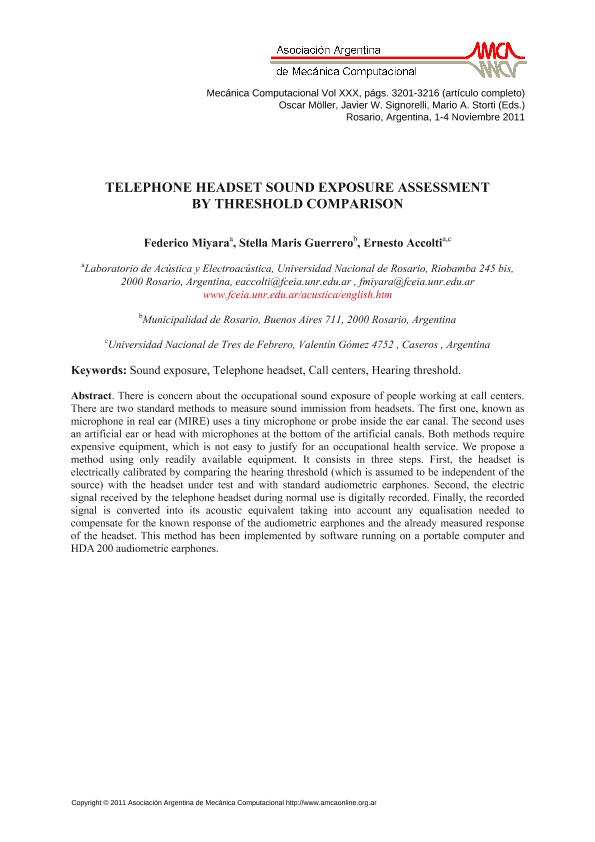Mostrar el registro sencillo del ítem
dc.contributor.author
Miyara, Federico

dc.contributor.author
Guererro, Stella Maris
dc.contributor.author
Accolti Mostazo, Ernesto Enrique

dc.date.available
2023-04-14T19:09:48Z
dc.date.issued
2011-11
dc.identifier.citation
Miyara, Federico; Guererro, Stella Maris; Accolti Mostazo, Ernesto Enrique; Telephone Headset Sound Exposure Assessment by Threshold Comparison; Asociación Argentina de Mecánica Computacional; Mecánica Computacional; XXX; 41 (B); 11-2011; 3201-3216
dc.identifier.issn
2591-3522
dc.identifier.uri
http://hdl.handle.net/11336/193998
dc.description.abstract
There is concern about the occupational sound exposure of people working at call centers. There are two standard methods to measure sound immission from headsets. The first one, known as microphone in real ear (MIRE) uses a tiny microphone or probe inside the ear canal. The second uses an artificial ear or head with microphones at the bottom of the artificial canals. Both methods require expensive equipment, which is not easy to justify for an occupational health service. We propose a method using only readily available equipment. It consists in three steps. First, the headset is electrically calibrated by comparing the hearing threshold (which is assumed to be independent of the source) with the headset under test and with standard audiometric earphones. Second, the electric signal received by the telephone headset during normal use is digitally recorded. Finally, the recorded signal is converted into its acoustic equivalent taking into account any equalisation needed to compensate for the known response of the audiometric earphones and the already measured response of the headset. This method has been implemented by software running on a portable computer and HDA 200 audiometric earphones.
dc.format
application/pdf
dc.language.iso
eng
dc.publisher
Asociación Argentina de Mecánica Computacional
dc.rights
info:eu-repo/semantics/openAccess
dc.rights.uri
https://creativecommons.org/licenses/by-nc-sa/2.5/ar/
dc.subject
Sound exposure
dc.subject
Telephone headset
dc.subject
Call centers
dc.subject
Hearing threshold
dc.subject.classification
Otras Ingeniería del Medio Ambiente

dc.subject.classification
Ingeniería del Medio Ambiente

dc.subject.classification
INGENIERÍAS Y TECNOLOGÍAS

dc.title
Telephone Headset Sound Exposure Assessment by Threshold Comparison
dc.type
info:eu-repo/semantics/article
dc.type
info:ar-repo/semantics/artículo
dc.type
info:eu-repo/semantics/publishedVersion
dc.date.updated
2023-04-13T14:34:24Z
dc.identifier.eissn
1666-6070
dc.journal.volume
XXX
dc.journal.number
41 (B)
dc.journal.pagination
3201-3216
dc.journal.pais
Argentina

dc.journal.ciudad
Santa Fe
dc.description.fil
Fil: Miyara, Federico. Universidad Nacional de Rosario. Facultad de Ciencias Exactas, Ingeniería y Agrimensura. Escuela de Ingeniería Electrónica. Laboratorio de Acústica y Electroacústica; Argentina
dc.description.fil
Fil: Guererro, Stella Maris. Provincia de Santa Fe. Municipalidad de Rosario; Argentina
dc.description.fil
Fil: Accolti Mostazo, Ernesto Enrique. Universidad Nacional de Rosario. Facultad de Ciencias Exactas, Ingeniería y Agrimensura. Escuela de Ingeniería Electrónica. Laboratorio de Acústica y Electroacústica; Argentina. Consejo Nacional de Investigaciones Científicas y Técnicas; Argentina
dc.journal.title
Mecánica Computacional

dc.relation.alternativeid
info:eu-repo/semantics/altIdentifier/url/https://cimec.org.ar/ojs/index.php/mc/article/view/3979
dc.relation.alternativeid
info:eu-repo/semantics/altIdentifier/url/https://cimec.org.ar/ojs/index.php/mc/article/viewFile/3979/3896
Archivos asociados
